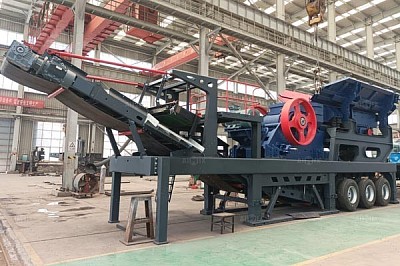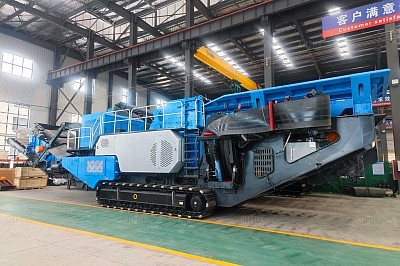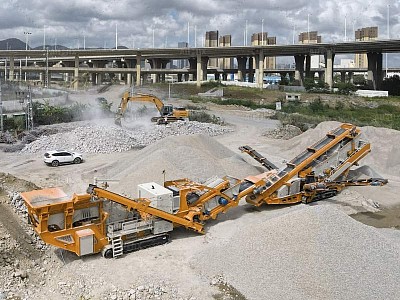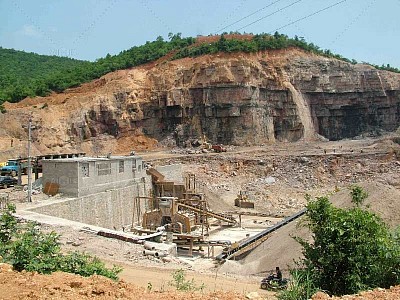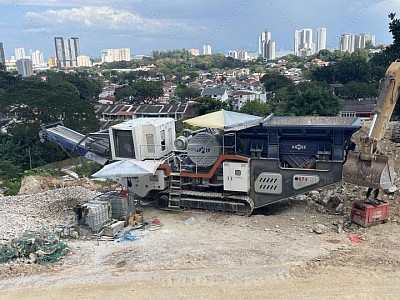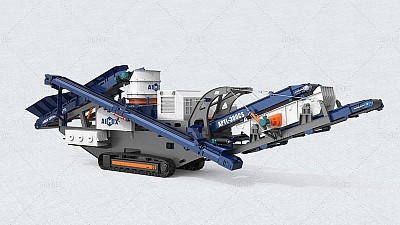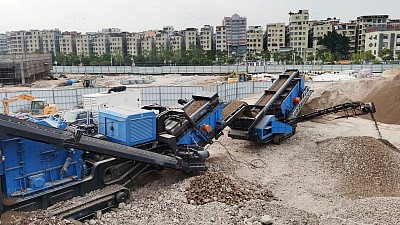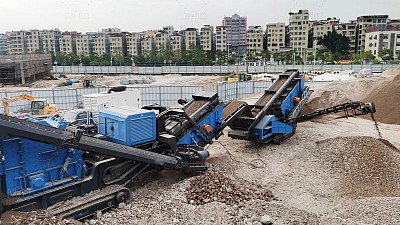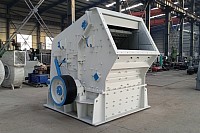Stone Crusher Plant
Ten Key Variables That Affect the Price of Aggregate Crusher Plants: Don't Let Hidden Costs Eat Up Your Budget
Purchasing an aggregate crusher plant is a significant investment, especially for contractors and quarry operators in the mining and construction industries. While initial equipment pricing might seem straightforward, the reality is more complex. Many buyers focus solely on the upfront cost and overlook several hidden variables that can dramatically affect the total investment over the plant’s operational life. These hidden factors, if not considered carefully, can lead to budget overruns and reduced returns.
This article breaks down ten key variables that influence the actual cost of owning and operating an aggregate crushing plant(planta de agregados). Whether you're planning to buy a jaw crusher, a mineral crusher, or a complete mobile crushing station, understanding these factors will help you make smarter decisions and protect your budget.
1. Equipment Configuration and Type
Not all crushers are created equal. The type and configuration of the plant—whether it includes a jaw crusher, cone crusher, impact crusher, or multiple stages—will significantly influence the price. More complex systems with integrated screening units, conveyors, and automation come at a premium, but they may reduce operating costs in the long term.
2. Capacity Requirements
The output capacity directly affects equipment size and pricing. A plant designed to process 100 tons per hour will cost significantly less than one built to handle 500 tons. It’s essential to match capacity with realistic project needs rather than overpaying for underutilized capacity.
3. Raw Material Hardness and Abrasiveness
Harder or more abrasive materials, such as granite or basalt, require stronger, more wear-resistant crushing components. This typically increases both the equipment price and the frequency of part replacements. Choosing the right mineral crusher(chancadora mineria) type based on material characteristics is essential to avoid premature wear and excessive maintenance.
4. Portability and Mobility
A stationary aggregate crusher plant is usually cheaper than a mobile one. However, mobile plants provide flexibility, especially for temporary or multi-site projects. The cost of chassis, tires or tracks, and hydraulic systems adds to the price but can lead to operational savings through easier relocation.
5. Power Source and Fuel Efficiency
Whether the plant runs on electricity or diesel affects both capital cost and operational expenses. Energy-efficient motors and advanced control systems may raise the initial price but offer savings over time. Diesel-powered units provide independence in remote areas but can incur higher fuel costs.
6. Automation and Control Systems
Modern crushing plants often come with automated features such as real-time diagnostics, remote monitoring, and automated adjustments. These technologies improve productivity and reduce labor costs but also add to the upfront investment.
7. Spare Parts and Local Support
A lower-cost crusher might seem attractive until you need to replace a key part that’s not readily available. Choosing a manufacturer with reliable after-sales service and accessible spare parts in your region can save money and downtime in the long run.
8. Transportation and Installation Costs
The cost to ship a jaw crusher(quebradora de quijada) or complete crushing unit to your site—especially in remote areas of Latin America—can be substantial. Add to this the cost of cranes, labor, and installation time, and you may find the actual cost of setup much higher than anticipated.
9. Maintenance Needs and Downtime
Some crushing plants are designed for easier access and faster maintenance, while others are more labor-intensive. High-maintenance systems may be cheaper up front but cost more over time due to frequent shutdowns and labor hours.
10. Regulatory Compliance and Environmental Features
Meeting environmental and safety standards may require additional investment in dust suppression, noise reduction, or energy-efficient technologies. These features are increasingly mandatory in many Latin American countries and should be factored into total cost considerations.
Conclusion
When evaluating the cost of an aggregate crusher plant, it's crucial to look beyond the sticker price. Capacity, mobility, automation, raw material characteristics, and long-term support all contribute to the true cost of ownership. Whether you're selecting a high-output jaw crusher for a long-term quarry operation or a compact mineral crusher for a mobile project, understanding these ten variables will help you avoid hidden costs and make a more informed, profitable investment.
By planning strategically and considering the full range of price-impacting factors, Latin American contractors and aggregate producers can ensure they select the right crushing solution without letting hidden expenses eat up their budget.
From Fine Jaw Crusher to Impact Crusher: Flexible Configuration Options for Mobile Crushers
In today’s fast-paced mining and aggregate industry, flexibility is key. Operators are increasingly looking for equipment that can be customized to match the specific needs of different projects and material types. Mobile crushers offer that flexibility—especially when it comes to their configuration. Whether you're dealing with hard granite, soft limestone, or recycled materials, the right crusher setup can make a significant difference in productivity, efficiency, and overall operating cost.
This article explores the versatile configuration options available in modern mobile stone crusher plants(planta de trituracion movil), focusing on how combinations like fine jaw crushers and impact crushers can help meet the diverse demands of the mining and aggregate sectors.
Why Configuration Flexibility Matters in Mobile Crushers
In the mining and aggregate industry, no two projects are exactly the same. Each site presents unique challenges based on the type of raw material, production requirements, and environmental conditions. That’s why a one-size-fits-all approach doesn’t work for crushing equipment.
A mobile stone crusher plant that allows flexible configurations—swapping between different types of crushers such as fine jaw crushers, cone crushers, and impact crushers—provides significant advantages. Operators can customize the system to optimize output quality and efficiency, ensuring that every ton of material is processed with maximum productivity.
Fine Jaw Crushers for Primary and Secondary Crushing
Ideal for Medium-Hard Materials
Fine jaw crushers are often used as both primary and secondary crushers in a stone crusher plant(planta trituradora de piedra) setup. These machines are known for their high crushing ratio and the ability to produce uniform-sized aggregates. They're especially effective for medium-hard materials like basalt and iron ore, where precision and consistent output are critical.
When integrated into a mobile configuration, fine jaw crushers provide an efficient start to the crushing process. Their compact size and efficient operation make them perfect for smaller sites or when space is limited. Additionally, they are relatively easy to maintain and operate, making them a popular choice for many crushing applications.
Smooth Integration With Other Crushing Equipment
Fine jaw crushers can be easily paired with secondary or tertiary crushers in a mobile setup. For example, combining a fine jaw crusher with a cone crusher allows for the creation of high-quality aggregates for use in road construction or concrete production. This combination ensures that large feed materials are reduced to suitable sizes before entering the secondary stage.
Impact Crushers for Versatility and High Reduction Ratios
Best Suited for Soft to Medium-Hard Materials
Impact crushers are ideal when dealing with softer stones such as limestone, concrete, or asphalt. They offer high reduction ratios and are capable of producing well-shaped, cubical aggregates. In mobile crusher configurations, impact crushers are often used in the secondary or tertiary position, following a jaw crusher.
Their high-speed rotor and adjustable breaker plates allow operators to modify the output size and shape, which is especially useful in projects where end-product quality is a top priority.
Quick Setup and Easy Maintenance
One of the biggest advantages of using impact crushers in a mobile stone crusher plant(planta trituradora Perú) is their ease of setup and maintenance. With fewer moving parts than cone crushers and high accessibility for maintenance tasks, impact crushers offer reduced downtime and improved reliability on site. This makes them an excellent choice for contractors who need to move from one project to another quickly.
Customizing Your Mobile Crusher Setup
Mixing and Matching for Maximum Efficiency
The real power of mobile crushers lies in their modular design. Operators can mix and match different types of crushers and screening units to build a configuration that suits the specific material and output requirements. For example, a plant could start with a fine jaw crusher to handle primary crushing and then switch to an impact crusher for producing finished aggregates.
This ability to reconfigure the plant on-site makes it possible to adapt quickly to new project requirements without the need for additional equipment. This level of flexibility is a game-changer for companies aiming to maximize return on investment in a competitive market.
Scalping and Screening Capabilities
Many mobile stone crusher plants come with integrated scalping and screening features. These components help remove fines before the material enters the primary crusher or sort the finished product into different sizes. This not only improves the efficiency of the entire process but also ensures better control over the quality of the final product.
Conclusion
The modern stone crusher plant is no longer a fixed system with limited options. Thanks to flexible configuration choices, mobile crushers can now be customized to suit virtually any crushing requirement. Whether it’s using a fine jaw crusher for precise primary crushing or an impact crusher for shaping softer materials, mobile configurations empower operators to respond to varying site conditions and production needs.
Choosing the right configuration for your mobile stone crusher plant means better performance, lower operational costs, and the ability to meet tight project timelines. For operators in the mining and aggregate industry, that flexibility can make all the difference in staying ahead of the competition.
What Equipment Is Needed to Build an Aggregate Plant?
Building an aggregate plant requires specialized equipment to process raw materials like limestone, granite, and gravel into high-quality construction aggregates. Whether for road construction, concrete production, or other industrial applications, selecting the right machinery is crucial for efficiency and cost-effectiveness. This article explores the essential equipment needed to set up a crusher plant and highlights the advantages of a mobile crusher plant for flexible operations.
Primary Equipment for an Aggregate Plant
1. Feeders – Ensuring a Steady Material Flow
Feeders regulate the flow of raw materials into the aggregate plant(planta de agregados), preventing overloads and ensuring a consistent supply. Common types include:
- Vibrating Grizzly Feeders (VGF) – Separate large rocks and fine materials before crushing.
- Belt Feeders – Deliver a controlled feed rate to crushers.
2. Crushers – Breaking Down Raw Materials
Crushers are the core of any crusher plant(planta chancadora), reducing large rocks into smaller, usable sizes. Different crushers serve specific functions:
- Jaw Crushers – Ideal for primary crushing, handling large, hard materials efficiently.
- Cone Crushers – Used for secondary or tertiary crushing, producing well-shaped aggregates.
- Impact Crushers – Best for softer materials or shaping aggregates after primary crushing.
- Mobile Crushers – Offer flexibility, allowing processing at different locations. A mobile crusher plant is beneficial for temporary sites or remote operations.
3. Screens – Separating and Classifying Aggregates
Screening is essential to separate aggregates into various sizes for different applications. Key screening equipment includes:
- Vibrating Screens – Sort materials based on size using mesh decks.
- Trommel Screens – Used in some applications for finer screening.
Supporting Equipment for an Efficient Crusher Plant
1. Conveyors – Transporting Crushed Materials
Conveyor belts move materials between different processing stages. They ensure efficiency by minimizing manual handling and speeding up production. Common types include:
- Belt Conveyors – Used for long-distance transport of aggregates.
- Stacking Conveyors – Help store processed aggregates in piles.
2. Washing Systems – Removing Impurities
For applications requiring high-quality aggregates, washing equipment removes dust, clay, and other impurities. Options include:
- Sand Washers – Clean fine aggregates for concrete production.
- Hydrocyclones – Separate unwanted materials from the final product.
3. Dust Suppression Systems – Controlling Air Pollution
Crushing and screening generate dust, which can affect air quality and equipment performance. Dust control solutions include:
- Water Sprinklers – Reduce airborne dust at critical points.
- Baghouse Filters – Capture fine dust in enclosed facilities.
4. Power Supply and Automation Systems
Running an aggregate plant requires a reliable power source and automation technology to monitor efficiency. These systems help:
- Reduce energy consumption.
- Improve production consistency.
- Enhance safety and reduce manual labor.
Advantages of Using a Mobile Crusher Plant
A mobile crusher plant(planta chancadora movil) is a versatile solution for aggregate production, especially for projects in remote locations or with short-term needs. Key benefits include:
1. Flexibility in Location
Unlike stationary plants, a mobile crusher plant can be moved directly to the excavation site, reducing material transportation costs.
2. Cost-Effective Operations
By processing aggregates on-site, companies save on hauling expenses and fuel costs, making operations more profitable.
3. Fast Setup and Reduced Downtime
Mobile plants can be assembled and operational within a short time, ensuring minimal delays in aggregate production.
4. Suitable for Various Applications
From road construction to demolition waste recycling, mobile crusher plants handle a variety of materials and crushing requirements.
Factors to Consider When Building an Aggregate Plant
1. Production Capacity
Selecting the right equipment depends on the required production output. Large-scale projects need high-capacity crushers and conveyors.
2. Aggregate Type
The hardness and abrasiveness of raw materials determine the choice of crushers and wear-resistant components.
3. Environmental and Regulatory Compliance
Dust control, noise reduction, and proper water management are critical to meet local regulations and environmental standards.
4. Maintenance and Spare Parts Availability
Reliable after-sales support and easy access to spare parts ensure smooth operation and reduce downtime.
Conclusion
Setting up an aggregate plant requires careful selection of equipment, from feeders and crushers to conveyors and washing systems. A crusher plant is the backbone of any aggregate production facility, with jaw, cone, and impact crushers playing essential roles. For greater flexibility and cost savings, a mobile crusher plant is an excellent choice, allowing on-site processing and reducing transportation expenses. By considering production needs, environmental factors, and operational efficiency, businesses can build a high-performing aggregate plant that meets industry demands.
How to Choose a Stone Crusher Based on Price and Performance
When you're in the market for a stone crusher, finding the perfect balance between price and performance is crucial. Whether you're working on a small-scale project or managing a large-scale operation, understanding the different aspects that influence the price and performance of a stone crusher will help you make an informed decision. In this article, we'll explore how to choose a stone crusher that aligns with your needs while staying within your budget.
Factors Affecting Stone Crusher Price
The price of a stone crusher(precio de trituradora de piedra) can vary significantly based on several factors. To make the best purchase, it's essential to understand what affects the cost of these machines.
1. Type of Stone Crusher
There are different types of stone crushers, including jaw crushers, cone crushers, impact crushers, and hammer crushers. Each type serves a unique purpose, and the choice depends on the materials being processed and the required output.
- Jaw Crushers are often used for primary crushing and are relatively affordable.
- Cone Crushers are designed for secondary or tertiary crushing and typically come with a higher price tag due to their complex design and higher efficiency.
- Impact Crushers are versatile, offering good performance in producing fine aggregates, but they can be slightly more expensive.
- Hammer Crushers are useful for crushing softer materials and can be cost-effective but may not be suitable for more challenging materials.
2. Production Capacity and Output Size
The production capacity (the volume of material a crusher can process per hour) is another significant determinant of price. Crushers with a higher production capacity generally cost more due to their larger size, more powerful engines, and advanced features. It's important to match the crusher's capacity with the scale of your operation.
Additionally, the output size of the material affects the crusher's design and performance. Crushers designed for finer outputs may come with additional features and controls, which can increase the cost.
3. Material Composition
The type of material you plan to crush—whether it's hard rock, gravel, or limestone—will also influence the choice and price of the stone crusher. Crushers that can handle more abrasive or harder materials, like granite, often have tougher components and are priced higher due to their enhanced durability and performance.
4. Brand and Manufacturer
Reputation plays a key role in determining the price of a stone crusher. Well-known manufacturers often charge a premium for their equipment, as their products tend to offer higher reliability, better warranty options, and superior customer support. While these brands may cost more upfront, they may save you money in the long run due to lower maintenance and operational costs.
Price vs. Performance: How to Strike the Right Balance
When choosing a stone crusher from AIMIX, it’s essential to balance price with performance. Here are some tips for finding the right balance between these two important factors.
1. Assess Your Needs
Start by clearly defining the scope of your project. If you're running a small-scale operation, you might not need the most expensive, high-capacity crusher. Conversely, large-scale projects, such as those in the mining or road construction industries, will require more robust equipment capable of handling higher volumes of material.
2. Calculate Long-Term Costs
While it may be tempting to go with the cheapest option available, consider the long-term costs associated with a lower-priced stone crusher. Cheaper machines may have a higher failure rate, leading to increased downtime and higher repair costs. Also, they might be less energy-efficient, driving up operating costs over time. It’s wise to choose a machine that strikes a balance between price and durability, as this can save you more money in the long run.
3. Consider the Cost of Spare Parts and Maintenance
The availability and cost of spare parts are an often-overlooked aspect of crusher pricing. A crusher that requires frequent repairs or has expensive replacement parts may result in additional costs that can exceed the savings from a lower initial purchase price. Look for machines with affordable and widely available spare parts, and consider the manufacturer's reputation for after-sales service.
4. Evaluate Efficiency and Output Quality
The efficiency of a stone crusher significantly impacts its overall performance. A highly efficient machine reduces energy consumption and wear and tear, leading to lower operating costs. Additionally, machines that provide consistent, high-quality output are critical for maintaining production standards, especially in industries that require precise grading of materials.
How to Compare Stone Crusher Prices
Once you've identified your requirements, it’s time to compare prices. Here’s how you can go about it:
1. Request Multiple Quotes
Get quotes from different suppliers or manufacturers to understand the price range for the stone crushers that meet your needs. This will give you a clearer idea of what you can expect to pay based on the type, capacity, and performance specifications you're looking for.
2. Look for Package Deals
Some manufacturers offer package deals that include installation, training, and after-sales service along with the crusher itself. These deals can provide added value, helping you avoid unforeseen costs later on.
3. Read Reviews and Testimonials
Customer reviews and testimonials can offer valuable insights into the performance, durability, and cost-effectiveness of different stone crushers. Checking user feedback on various platforms or directly contacting past customers can help you make a more informed decision.
Conclusion
Choosing the right stone crusher requires balancing price with performance to ensure you get the best value for your investment. Consider factors such as the type of crusher, production capacity, material composition, and long-term operational costs before making your decision. By assessing your needs and comparing prices from different manufacturers, you can find a stone crusher that meets your requirements without exceeding your budget.
Why Choose a Mobile Stone Crusher for Your Quarrying Needs?
Quarrying operations demand efficiency, flexibility, and cost-effectiveness. In recent years, the mobile stone crusher has gained popularity as a powerful and versatile solution for processing materials on-site. Paired with its adaptability as a mineral crusher, this machine is now a preferred choice for many industries. But what makes it stand out? Let’s explore the benefits and reasons why a mobile stone crusher might be the perfect fit for your quarrying needs.
What Is a Mobile Stone Crusher?
A mobile stone crusher(planta trituradora de piedra móvil) is a portable crushing machine designed to crush and process a variety of materials, such as rocks, minerals, and stones, directly on-site. Unlike traditional stationary crushers, it offers mobility and convenience, making it highly suitable for quarrying and mining operations.
Key Features of Mobile Stone Crushers
- Portability: Easy to transport to remote or multiple quarrying sites.
- Efficiency: Processes materials directly on location, reducing transport costs.
- Versatility: Functions as both a stone and mineral crusher, handling a wide range of materials.
- Compact Design: Suitable for confined or challenging terrains.
Benefits of Using a Mobile Stone Crusher
1. Enhanced Mobility and Flexibility
One of the primary advantages of a mobile stone crusher is its mobility. Whether working on large-scale mining projects or smaller quarrying operations, its ability to move between locations ensures minimal downtime and greater operational flexibility.
2. Cost-Effective Operations
By processing materials directly at the site, mobile stone crushers significantly reduce transportation costs. Additionally, their ability to handle multiple material types, including minerals, eliminates the need for multiple machines, further cutting costs.
3. High Productivity
Mobile stone crushers deliver consistent and efficient crushing performance. As a mineral crusher(trituradora de minerales), it can process hard materials like granite, limestone, and ores, ensuring steady production and meeting project deadlines.
4. Eco-Friendly Solution
These crushers contribute to sustainable quarrying practices by reducing the environmental impact of material transport and waste. On-site crushing minimizes emissions and promotes recycling of materials, such as construction debris.
Applications of Mobile Stone Crushers in Quarrying
1. Aggregate Production
Mobile stone crushers are widely used to produce aggregates for construction materials such as concrete, asphalt, and road bases. Their efficiency ensures a consistent supply of high-quality aggregates.
2. Mineral Processing
In mining and quarrying, mobile crushers double as mineral crushers, effectively crushing ores and minerals like iron, copper, and gold. Their durability and performance make them essential for mineral-rich sites.
3. Road and Infrastructure Projects
Quarrying for road construction requires a reliable supply of crushed materials. Mobile crushers simplify this process by providing on-site crushing solutions, ensuring timely delivery of materials.
4. Recycling and Waste Management
Mobile stone crushers are not limited to natural materials. They are also ideal for recycling construction waste, turning rubble into reusable resources, and reducing landfill contributions.
How to Choose the Right Mobile Stone Crusher
1. Material Type and Hardness
Different projects require different capabilities. Choose a mobile stone crusher that can handle the hardness and size of your materials, whether stones, ores, or minerals.
2. Production Capacity
Assess your operational needs and select a machine with an appropriate output capacity. Overestimating or underestimating your requirements can affect efficiency and costs.
3. Site Conditions
Evaluate the terrain and working conditions of your quarrying site. Ensure the crusher has the mobility and design features to navigate challenging environments.
4. Manufacturer and After-Sales Support
Investing in a mobile stone crusher is a long-term decision. Choose a reputable manufacturer that provides reliable equipment and excellent after-sales support, ensuring minimal downtime.
Conclusion
A mobile stone crusher is a game-changing solution for quarrying operations, offering unparalleled flexibility, efficiency, and cost savings. Its versatility as both a stone and mineral crusher ensures it can meet diverse industry demands, from aggregate production to mineral processing and waste recycling. Whether you’re managing a large-scale quarry or smaller projects, a mobile stone crusher is an investment that promises to enhance productivity and sustainability.
Plantas Trituradoras de Piedra Energéticamente Eficientes para las Industrias
En las industrias de minería y agregados, la eficiencia energética se ha convertido en un factor clave para mejorar la sostenibilidad y reducir costos operativos. Las plantas trituradoras de piedra desempeñan un papel fundamental en este proceso, permitiendo la reducción y procesamiento eficiente de grandes volúmenes de material. Este artículo explora cómo una planta trituradora de piedra puede optimizar el consumo de energía, beneficiando tanto a las empresas como al medio ambiente.
La Eficiencia Energética en las Plantas Trituradoras de Piedra
Reducción de Consumo Energético
La eficiencia energética en una planta chancadora de piedra Perú no solo mejora la rentabilidad de las operaciones, sino que también minimiza el impacto ambiental. Las trituradoras modernas están diseñadas para consumir menos energía mientras maximizan la producción de agregados de alta calidad. Esto se logra a través de tecnologías avanzadas que optimizan el proceso de trituración y reducen la cantidad de energía necesaria para fragmentar el material.
Impacto Ambiental Reducido
Uno de los mayores beneficios de las plantas trituradoras de piedra energéticamente eficientes es la reducción de la huella de carbono de las operaciones mineras y de agregados. Al utilizar menos energía, estas plantas generan menos emisiones de gases de efecto invernadero, contribuyendo a la protección del medio ambiente. Esto es especialmente importante en un contexto global donde las regulaciones ambientales son cada vez más estrictas.
Tecnologías que Mejoran la Eficiencia Energética
Trituradoras de Alta Eficiencia
Las trituradoras de alta eficiencia están equipadas con sistemas que optimizan el uso de la energía en cada fase del proceso. Estas máquinas están diseñadas para maximizar la cantidad de material procesado con la menor cantidad de energía posible. Al reducir el tiempo y la energía que se requiere para triturar rocas, las empresas pueden mejorar significativamente su eficiencia operativa.
Motores de Bajo Consumo
Muchas plantas trituradoras de piedra modernas incorporan motores de bajo consumo que están diseñados específicamente para minimizar el uso de energía sin comprometer el rendimiento. Estos motores permiten que las trituradoras operen a su máxima capacidad mientras consumen menos electricidad. Esto no solo reduce los costos operativos, sino que también prolonga la vida útil de los equipos, reduciendo la necesidad de mantenimiento y reemplazo frecuente.
Automatización y Control Inteligente
La automatización en las plantas trituradoras de piedra permite un mayor control sobre el proceso de trituración, optimizando la eficiencia energética. Los sistemas de control inteligente ajustan automáticamente los parámetros de la trituradora para adaptarse a las condiciones de trabajo, asegurando que el uso de energía se mantenga en niveles óptimos en todo momento. Esto evita el consumo innecesario de energía y maximiza la producción.
Beneficios de la Eficiencia Energética en la Minería y Producción de Agregados
Ahorro de Costos Operativos
El uso de una planta trituradora de piedra energéticamente eficiente reduce significativamente los costos operativos. Menos consumo de energía se traduce en facturas de electricidad más bajas, lo que puede marcar una gran diferencia en proyectos mineros y de agregados a gran escala. Además, las tecnologías avanzadas que mejoran la eficiencia energética también suelen requerir menos mantenimiento, lo que reduce aún más los costos a largo plazo.
Cumplimiento con Normativas Ambientales
En muchos países, las industrias de minería y agregados están sujetas a normativas estrictas en cuanto a la emisión de contaminantes y el uso de energía. Al operar una planta trituradora de piedra energéticamente eficiente, las empresas pueden cumplir con estas normativas y evitar multas o sanciones. Además, estas plantas ayudan a mejorar la reputación de las empresas al demostrar un compromiso con la sostenibilidad y la responsabilidad ambiental.
Mayor Vida Útil del Equipo
Al utilizar menos energía y optimizar el rendimiento del equipo, las plantas trituradoras de piedra energéticamente eficientes también ayudan a prolongar la vida útil de los equipos. Las trituradoras que operan de manera eficiente sufren menos desgaste, lo que reduce la frecuencia de reparaciones y reemplazos. Esto no solo disminuye los costos de mantenimiento, sino que también evita interrupciones en la producción.
Factores a Considerar al Elegir una Planta Trituradora Energéticamente Eficiente
Tamaño y Capacidad de Producción
Uno de los factores más importantes a tener en cuenta al seleccionar una planta trituradora de piedra es el tamaño y la capacidad de producción. Es crucial elegir una planta que no solo sea energéticamente eficiente, sino que también pueda manejar el volumen de material necesario para cumplir con los requisitos del proyecto. Las plantas más grandes tienden a consumir más energía, por lo que es importante asegurarse de que el ahorro energético sea proporcional a la capacidad de producción.
Características del Material a Procesar
El tipo de material que se va a triturar también afecta la eficiencia energética de una planta. Materiales más duros y abrasivos requieren más energía para ser procesados, por lo que es esencial seleccionar una trituradora que esté diseñada para manejar este tipo de material de manera eficiente. Las plantas trituradoras de piedra especializadas para materiales duros pueden ofrecer importantes ahorros energéticos al reducir el tiempo de procesamiento.
Tecnología de Automatización
Optar por una planta con sistemas de automatización avanzados es una excelente manera de mejorar la eficiencia energética. Las tecnologías que permiten el ajuste automático de los parámetros de trituración no solo mejoran la producción, sino que también garantizan que la trituradora funcione de manera eficiente en todo momento. Esto puede ser especialmente beneficioso en proyectos donde las condiciones cambian constantemente, como en la minería.
Conclusión
Las plantas trituradoras de piedra energéticamente eficientes son esenciales para las industrias de minería y agregados modernas. Al reducir el consumo de energía, estas plantas no solo mejoran la rentabilidad de las empresas, sino que también contribuyen a la sostenibilidad y la protección del medio ambiente. A través de la adopción de tecnologías avanzadas, como trituradoras de alta eficiencia, motores de bajo consumo y sistemas de automatización, las empresas pueden maximizar su eficiencia operativa mientras minimizan su impacto ambiental. Elegir la planta trituradora adecuada puede marcar una gran diferencia en el éxito a largo plazo de cualquier proyecto minero o de agregados.
Optimiza tu proyecto de minería con una planta chancadora de piedra Perú
En el sector minero, la eficiencia es clave para lograr un proyecto exitoso y rentable. Una de las herramientas más efectivas para optimizar los procesos de extracción y procesamiento de materiales es el uso de plantas chancadoras de piedra Perú. Estas plantas no solo agilizan el trabajo de trituración de roca y agregados, sino que también permiten reducir costos y mejorar la calidad de los materiales obtenidos. En este artículo, exploraremos cómo las plantas chancadoras pueden beneficiar a tus operaciones mineras y cómo AIMIX ofrece soluciones efectivas para mejorar tu proyecto.
¿Qué es una planta chancadora de piedra?
Función principal de una planta chancadora
Una planta chancadora de agregados perú es un equipo diseñado para reducir grandes bloques de piedra o minerales en tamaños más manejables, los cuales son utilizados posteriormente en la construcción y otros sectores industriales. En la minería, su uso es esencial para obtener agregados que cumplen con los estándares de calidad necesarios para distintos proyectos.
Tipos de plantas chancadoras
Las plantas chancadoras de piedra Perú pueden ser fijas o móviles, dependiendo de las necesidades del proyecto. Las plantas fijas son ideales para proyectos a largo plazo en una ubicación determinada, mientras que las plantas móviles permiten mayor flexibilidad, ya que pueden trasladarse fácilmente de un sitio a otro. Ambas opciones son altamente eficientes y pueden adaptarse a distintos tipos de materiales y volúmenes de producción.
Beneficios de una planta chancadora de agregados para tu proyecto minero
Aumento de la productividad
Uno de los mayores beneficios de utilizar una planta chancadora de agregados en minería es el aumento en la productividad. Estos equipos están diseñados para triturar grandes cantidades de material de manera rápida y eficiente, lo que reduce significativamente el tiempo necesario para procesar el material extraído. Además, el uso de tecnología avanzada permite obtener agregados de diferentes tamaños, lo que es ideal para satisfacer diversas necesidades en la construcción y otras industrias.
Reducción de costos operativos
La planta chancadora de agregados no solo mejora la eficiencia, sino que también contribuye a una reducción significativa de los costos operativos. Al triturar el material en el sitio de extracción, se eliminan los costos de transporte y manejo de grandes bloques de piedra. Esto también reduce el desgaste de otros equipos de maquinaria, ya que los materiales procesados son más fáciles de manejar. A largo plazo, estas plantas representan una inversión rentable para cualquier operación minera.
Mejora de la calidad del material
Otra ventaja clave de las plantas chancadoras de piedra Perú es la mejora en la calidad del material procesado. Al utilizar estos equipos, es posible obtener agregados uniformes y con las características exactas que requieren los distintos proyectos. Esto no solo mejora la eficiencia de la construcción, sino que también garantiza que el producto final cumpla con los estándares de calidad exigidos en la industria.
AIMIX: La solución perfecta para tu planta chancadora de piedra en Perú
Innovación y tecnología avanzada
AIMIX, una de las principales marcas en el sector de maquinaria de construcción y minería, ofrece soluciones de alta tecnología para plantas chancadoras de piedra Perú. Las plantas de AIMIX Group China están equipadas con lo último en tecnología de trituración, lo que asegura un rendimiento óptimo y duradero. Además, los diseños de AIMIX están pensados para ofrecer facilidad de uso y mantenimiento, lo que reduce el tiempo de inactividad y aumenta la productividad general.
Variedad de modelos y configuraciones
Uno de los aspectos que distingue a AIMIX es la amplia variedad de modelos de plantas chancadoras de agregados que ofrece. Ya sea que necesites una planta móvil o fija, AIMIX tiene una solución que se ajusta a las necesidades de tu proyecto. Además, las configuraciones pueden personalizarse para manejar diferentes tipos de materiales, desde roca dura hasta agregados más suaves, lo que te permite optimizar el proceso de acuerdo con las demandas específicas de cada operación minera.
Servicio postventa y soporte técnico
Además de proporcionar equipos de alta calidad, AIMIX se destaca por su excelente servicio postventa. La marca ofrece soporte técnico continuo y mantenimiento para asegurar que las plantas chancadoras operen al máximo rendimiento. Este servicio es esencial para minimizar el tiempo de inactividad y garantizar la rentabilidad del proyecto a largo plazo.
Conclusión
Invertir en una planta chancadora de piedra Perú es una decisión estratégica que puede transformar la eficiencia y rentabilidad de cualquier proyecto minero. Al ofrecer una solución efectiva para la trituración de materiales, las plantas chancadoras permiten aumentar la productividad, reducir costos operativos y mejorar la calidad de los agregados procesados. Con la gama de productos y servicios que ofrece AIMIX, podrás encontrar la planta chancadora perfecta que se ajuste a las necesidades de tu operación y asegurar el éxito de tu proyecto.
Por qué las trituradoras de piedra son un componente vital para las obras de construcción
En el ámbito de la construcción, la eficiencia y la calidad de los materiales son factores clave para el éxito de cualquier proyecto. Las trituradoras de piedra juegan un papel crucial en la preparación de estos materiales, asegurando que las obras cuenten con los recursos necesarios para cumplir con los estándares de calidad. Este artículo explora la importancia de las trituradoras de piedra y cómo contribuyen al desarrollo de las construcciones modernas.
La función esencial de las trituradoras de piedra
Producción de agregados de calidad
Las trituradoras de piedra son fundamentales en la producción de agregados, los cuales son componentes principales del concreto, el asfalto y otros materiales de construcción. Estos agregados deben tener el tamaño y la forma adecuados para garantizar la durabilidad y resistencia de las estructuras.
Ventajas de los agregados producidos por una planta chancadora de piedra
- Uniformidad: Las trituradoras de piedra permiten obtener agregados con tamaños uniformes, lo que mejora la cohesión en mezclas de concreto y asfalto.
- Reducción de impurezas: Al pasar las piedras por un proceso de trituración, se eliminan materiales indeseables como arcilla o polvo, lo que resulta en un producto más limpio y apto para la construcción.
- Eficiencia en la producción: Las trituradoras de piedra son capaces de procesar grandes volúmenes de material en poco tiempo, asegurando un suministro constante de agregados.
Versatilidad en el uso de materiales
Una planta chancadora de piedra no solo produce agregados para la construcción, sino que también es capaz de procesar una variedad de materiales, como roca, grava y minerales. Esta versatilidad permite que las trituradoras se utilicen en diversos proyectos, desde la construcción de carreteras hasta la edificación de grandes infraestructuras.
Aplicaciones comunes de las trituradoras de piedra
- Construcción de carreteras: Los agregados producidos son esenciales para la base y el pavimento de las carreteras, proporcionando estabilidad y resistencia.
- Edificación de estructuras: En la construcción de edificios, los agregados son un componente crucial en las mezclas de concreto utilizadas para cimientos, columnas y vigas.
- Proyectos de infraestructura: Grandes proyectos como puentes, presas y túneles requieren agregados de alta calidad, que solo pueden ser producidos eficientemente mediante el uso de trituradoras de piedra.
Factores a considerar al elegir una trituradora de piedra
Tipos de trituradoras de piedra en venta
Existen diferentes tipos de trituradoras de piedra en venta, cada una diseñada para cumplir con necesidades específicas de los proyectos de construcción. Es importante seleccionar la trituradora adecuada para garantizar la eficiencia y calidad en la producción de agregados.
Tipos principales de trituradoras
- Trituradora de mandíbula: Ideal para la trituración primaria, esta trituradora es conocida por su durabilidad y capacidad para manejar grandes volúmenes de material.
- Trituradora de cono: Utilizada en la trituración secundaria, esta trituradora es perfecta para producir agregados con formas precisas y uniformes.
- Trituradora de impacto: Excelente para producir agregados finos y mejorar la calidad del producto final.
Consideraciones de costos y mantenimiento
Al invertir en una planta chancadora de piedra Chile, es esencial considerar no solo el costo inicial, sino también los costos operativos y de mantenimiento. Una trituradora bien mantenida puede tener una vida útil prolongada y ofrecer un mejor retorno de inversión.
Claves para una inversión rentable
- Costo inicial: Evalúa el precio de la trituradora en relación con su capacidad y durabilidad.
- Mantenimiento: Opta por trituradoras que requieran un mantenimiento sencillo y que cuenten con fácil acceso a repuestos.
- Eficiencia energética: Las trituradoras más eficientes en el consumo de energía pueden reducir significativamente los costos operativos a largo plazo.
Conclusión: La importancia estratégica de las trituradoras de piedra
Las trituradoras de piedra son mucho más que simples máquinas en un sitio de construcción; son componentes vitales que garantizan la calidad y eficiencia de los materiales utilizados en la edificación de infraestructuras. Desde la producción de agregados hasta la versatilidad en el manejo de diferentes materiales, estas máquinas son indispensables para el éxito de cualquier proyecto de construcción.
Al seleccionar una planta chancadora de piedra, es crucial considerar factores como el tipo de trituradora, los costos operativos y las necesidades específicas del proyecto. Con la trituradora adecuada, las empresas de construcción pueden optimizar sus procesos, reducir costos y, lo más importante, asegurar la durabilidad y calidad de las estructuras que construyen.
Mobile Crusher Plants Lead the Way in Sustainable Mining
The mining industry is increasingly focused on sustainability and environmental responsibility. As part of this shift, mobile crusher plants have emerged as a key technology driving sustainable mining practices. These versatile and efficient machines offer numerous benefits over traditional stationary plants, making them an essential part of modern mining operations. This article explores how mobile stone crusher plants are leading the way in sustainable mining.
Enhanced Flexibility and Mobility
One of the primary advantages of mobile stone crusher plants(plantas trituradoras móviles de piedra) is their exceptional flexibility and mobility. Unlike stationary plants, mobile crusher plants can be easily relocated to different mining sites. This mobility is crucial for mining operations that cover large areas or require frequent site changes. By being able to move the crushing equipment directly to the extraction site, companies can significantly reduce transportation costs and minimize the environmental impact associated with moving raw materials.
On-Site Processing
Mobile crusher plants enable on-site processing of materials, which is a significant step toward sustainability. On-site crushing means that raw materials can be processed immediately after extraction, reducing the need for transportation and handling. This immediate processing not only saves time and costs but also maintains the quality of the materials by reducing contamination and degradation. On-site processing also means fewer emissions from transporting materials, contributing to a lower carbon footprint for mining operations.
Cost-Effective Operations
Investing in mobile stone crusher plants can lead to substantial cost savings. The reduction in transportation costs is one of the most significant financial benefits. Additionally, mobile plants are designed to be highly efficient, with advanced technologies that optimize fuel consumption and minimize maintenance needs. These cost-effective operations make mobile crusher plants an attractive option for mining companies looking to improve their bottom line while maintaining sustainable practices.
Versatility and Customization
Mobile crusher plants are known for their versatility. They can handle a wide range of materials, from hard rock to recycled concrete, making them suitable for various mining applications. This adaptability is essential in an industry where material types can vary significantly between projects. Furthermore, mobile plants can be customized with different attachments and configurations to meet specific operational requirements. This level of customization ensures that mining companies can maximize their investment and achieve optimal efficiency.
Environmental Benefits
Mobile crusher plants offer several environmental benefits that align with sustainable mining practices. By enabling on-site processing, these plants reduce the need for material transportation, resulting in lower carbon emissions and fuel consumption. Additionally, modern mobile crusher plants(plantas de chancadoras) are designed to be more energy-efficient and to produce less dust and noise compared to traditional crushing methods. These environmental advantages help mining companies reduce their ecological footprint and adhere to stricter environmental regulations.
Conclusion
In conclusion, mobile stone crusher plants are at the forefront of sustainable mining practices. Their flexibility, cost-effectiveness, and environmental benefits make them an invaluable asset for modern mining operations. As the industry continues to prioritize sustainability, mobile crusher plants will play a crucial role in reducing the environmental impact of mining while enhancing operational efficiency. By adopting these innovative technologies, mining companies can lead the way toward a more sustainable future.
